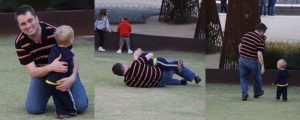The Clock Starts Ticking After an ALS Diagnosis

After my husband, Todd, was diagnosed with ALS, we went on what we thought would be our last family vacation. We flew into Los Angeles, visited friends, and toured some sites.
I took a lot of pictures — our 5-year-old daughter meeting princesses at Disneyland, our 18-month-old son rolling down a hill with his daddy outside the Getty Center, the kids playing on a San Diego beach.
We purchased souvenirs at the Birch Aquarium. Our daughter got an otter puppet, our son got a stuffed shark, and I picked out a funky, blue-and-white patterned potholder. “When I use this, I’ll remember our time with Todd,” I thought.
With a prognosis of death in two to five years, we felt a sense of urgency to bank memories. The clock was ticking.
Todd and I were like our kids at a park after I yelled, “Five more minutes!” They’d run around the playground trying to squeeze in one more go on the slide, the swing, and the sand digger.
There’s precious little time after being diagnosed with ALS. Even if life expectancy is a few years, paralysis can come sooner.
After returning from California, we connected with a couple in our neighborhood through a mutual friend. The husband had begun slurring his speech the previous January. His doctors thought he’d had a stroke, but after he experienced foot drop in July, they recognized it as ALS.
Join our ALS forums: an online community especially for patients with Amyotrophic Lateral Sclerosis.
The couple was still reeling from the diagnosis when we invited them for dinner. They walked the three blocks to our home on a warm August evening. Todd grilled chicken, and I cut up fruit and made a salad.
Because we shared their sorrow, we were able to connect in other aspects of life. We learned about how they met, the work they did, and their adult children. The man would tell a story, and his wife would interpret a few words that were particularly difficult for us to understand. She showed great affection for him, sitting by his side and gently stroking the back of his head.
Todd asked, “Is there anything you’ve always wanted to do, but didn’t have a chance?”
“Travel to Denmark,” she replied almost immediately. “He hasn’t met my family yet.”
“Then go! Go as soon as you can,” Todd urged them.
They left a month later. He walked onto the airplane for the flight there, but returned in a wheelchair. He died five months later, a little over a year after his first symptoms appeared.
His wife later told us that she would forever cherish the memories from that vacation.
In our case, the California trip was the last time we all traveled by plane. The kids wish we could visit Disneyland again — especially our son, who can only “remember” it from pictures — but it would be too difficult now that Todd’s in a power wheelchair. However, California wasn’t our last vacation.
We’ve been able to take the kids to places that are accessible and within driving distance. For spring break, we went to the Mall of America. We traveled to northern Minnesota to see Todd’s parents and spend time at the lake house.
Our time with a ticking clock has been like other days at the park when, after giving the kids a five-minute warning, I’d get a call on my cellphone or get to chatting with another mom. The kids would make the rounds from one piece of playground equipment to another, and then they’d go back through them. They were squeezing in more fun, thinking their time was limited, but eventually, the pace of their play would slow.
It’s been nine years since Todd was diagnosed with ALS, and the pace of our play intermittently slows. We almost forget that Todd has limited time. That potholder I bought in San Diego — the one I thought I would use and remember our time with him — wore out. I threw it away, and my son gave me new potholders for my Christmas gift last year.
Unfortunately, an ALS story never ends with forgetting that time is limited. There is always progression of the disease. There’s always another setback, another “five-minute warning” in the form of a sharp decline of forced vital capacity or a choking incident.
What else can we squeeze in? Family movie nights, hockey games, maybe some personal videos and letters for the kids — anything to bank the memories.
We are seizing the day, trying to have one more go at everything we love.
***
Note: ALS News Today is strictly a news and information website about the disease. It does not provide medical advice, diagnosis, or treatment. This content is not intended to be a substitute for professional medical advice, diagnosis, or treatment. Always seek the advice of your physician or other qualified health provider with any questions you may have regarding a medical condition. Never disregard professional medical advice or delay in seeking it because of something you have read on this website. The opinions expressed in this column are not those of ALS News Today or its parent company, Bionews Services, and are intended to spark discussion about issues pertaining to ALS.








Richard Curtis
Yet another story of somebody living with ALS that has brought me to tears, I am also a sufferer and was diagnosed in March 2018, so 18 months in, I am now in a wheelchair , living life and enjoying moments with family and friends, but reading stories like this always bring tears to my eyes.
mary sieck
My husband was diagnosed in August of 2018 The ticking clock is always in the forefront of my mind and watching my husband losing his ability to do simple things. I've spent many hours asking why such a horrific disease even exists. I too sit next to my husband and stroke his hand. Our social is non-existence except for two very close friends who come visit once a week and we sit and talk and laugh. Without them in our lives I am not sure if either of us would still have our sanity. Our children and grandchildren come visit but not nearly enough. Life moves on for everyone around us but we are stuck in this world of "what the heck?" we started out taking it one day at a time, now we take it one minute at a time because indeed the CLOCK IS TICKING.
Douglas Cross
I have two sisters with ALS, I have been tested for the repeating gene that has affected my older sisters. I was found positive . I do not have any signs of ALS at this point. My sisters are still living but the clock is still ticking. The mayo clinic has put me in a trial to take some blood and some spinal fluid to monitor and study to some day a cure may be found.
Bill
The clock is ticking for us all. Just running faster for us with ALS. Some of our ALS clocks run fast , some slower. We live our lives as our progression allows. On Patientslikeme site, it is good to see the daily lives of pALS and to share daily challenges and successes in living while we can. I’ve learned more from my pALS there than from the professionals.
Richard Osness ReinsvoldRi, M.D.
Your comment is so very insightful. I do my best to live my life to the fullest. My focus is not my disease, but to spend time with family, go on vacations, and obsess over one thing ... how can I make the quality of my current life for my family and myself even better. Unfortunately the time clock of ALS can progressed quickly,or for a few it can progress slowly, some can even stall, or can quickly speed up without warning after a stall. All we have is today, tomorrow is uncertain. Live well, and don't fret over that which you can't change.
Donna ward
My mom died of a la and only lived 6 mo.they said they had never seen it progress that fast.
Chuck Kroeger
Thanks for the encouraging words Kristin. I was diagnosed with ALS in April 2019 but the symptoms started in late summer of 2018. I was originally diagnosed as having Chronic Fatigue Syndrome and anorexia, and was advised to spend more time working out to build muscle - wrong.. Time is ticking but the Lord has blessed us with many, many wonderful friends and family to spend it with. Several of them were standoffish at first, not knowing what to say or how to act around a person with a terminal illness. But letting them know how I am energized by their presence seems to have helped.
Cassandra
My mom has just been diagnosed with ALS,after more than 3 years of texting.she has hardly any use of left arm,uses enhaler every morning.what things can we do to slow this process down?diets? Treatment? Any advise would greatly be appreciated.